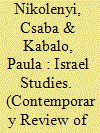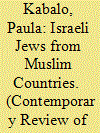| Srl | Item |
| 1 |
ID:
169974


|
|
|
| 2 |
ID:
154499


|
|
|
|
|
| Summary/Abstract |
The main legal instrument that regulates the right of association for nonprofit purposes in Israel is the Amutot (Non-Profit Organisations) Law, 1980 (hereinafter: the NPO Law and, preceding its passage, the NPO Bill). It creates a legal framework for associations that pursue a socially or culturally shared goal as opposed to a business purpose. This article describes the first chapter of the legislative process (1948–1954) that led eventually to the enactment of the 1980 statute. It focuses on two central issues: the extent of governmental discretion that may be applied in registering an NPO and in taking one apart. Our main argument is that the professional and public debate over these issues and the incidence or exceptioning of political parties from the bounds of the NPO Bill reflected the tension between the various Democratic approaches that held sway in the corridors of Israel’s governing system during early years of statehood.
|
|
|
|
|
|
|
|
|
|
|
|
|
|
|
|
| 3 |
ID:
169982


|
|
|
|
|
| Summary/Abstract |
This article sheds light on the salient and far-reaching pattern of association-forming among Jewish immigrants from Muslim countries in Israel during the 1950s and 1960s. They were formally established associations that operated by means of representatives and spokespersons and strove to mediate between the population group that they represented and the state authorities that dealt with immigration and its integration. Interestingly, although few of the members or leaders of these entities have lived under democratic regimes, they established organizations that operated on the basis of democratic principles: election of representatives, holding members’ assemblies, and freedom of expression. They articulated their positions publicly and openly and were not deterred from criticizing policymakers, even those in the highest of echelons.
|
|
|
|
|
|
|
|
|
|
|
|
|
|
|
|
| 4 |
ID:
082290


|
|
|
|
|
| Publication |
2008.
|
| Summary/Abstract |
Shurat ha-Mitnadvim was founded in the winter of 1951-1952 by students from the Hebrew University as a volunteer organization promoting norms of good citizenship by furthering the social integration of new immigrants and exposing prodigality and corrupt practices in the public sector. Shurat ha-Mitnadvim offered a structural and ideological alternative to the dominant model of civil organizing that persisted from the Yishuv (pre-statehood) to the early statehood period, which was accepted with relative tolerance during most of Shurat ha-Mitnadvim's years of activity. At a certain stage, however, it found itself in a head-on confrontation with the state authorities that it criticized and with political parties and other national-level suborganizations (the Jewish Agency and the Federation of Labor in Israel). These institutions regarded themselves as the main mediators between the citizen and the governing authorities and therefore as more "legitimate" than Shurat ha-Mitnadvim. The whole affair and its main characteristic, the novelty of the challenge that it expressed, and the reverberations that the activity of a civil-society organization sent through the reality of a young, self-defensive democracy, are the focal points of this article.
|
|
|
|
|
|
|
|
|
|
|
|
|
|
|
|